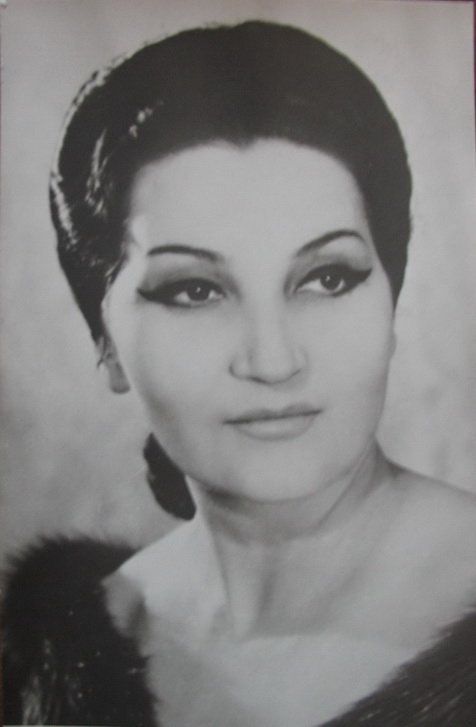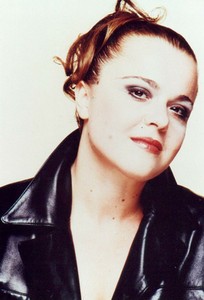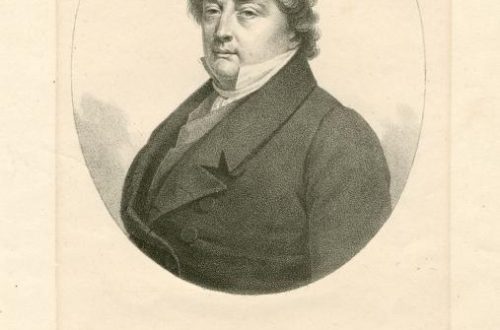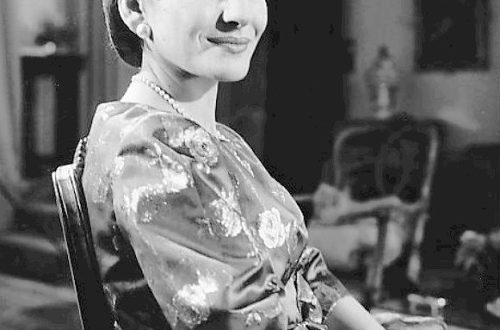
Galina Oleinichenko |
Galina Oleinichenko
This year is rich in anniversaries of the masters of the national vocal school. And we celebrate the first of them at the end of February, on the eve of the long-awaited spring. This is all the more symbolic because the talent of our hero of the day, or rather the hero of the day, is in tune with the spring mood – bright and pure, gentle and lyrical, light and reverent. In a word, today we are honoring the wonderful singer Galina Vasilievna Oleinichenko, whose unforgettable voice has sounded in our vocal firmament for about thirty years and is well known to all opera lovers.
Galina Oleynichenko is famous, first of all, as a coloratura star of the Bolshoi Theater of the 60-70s. However, she came to Moscow as an already established singer, and besides, having won three vocal competitions. However, the most significant milestones of her career are associated with the main opera stage of the USSR: it was here, in the theater, which was the ultimate dream and the highest point of the career of any Soviet vocalist, that the singer’s singing and stage talent was most revealed.
Galina Oleinichenko was born on February 23, 1928 in Ukraine, like the great Nezhdanova near Odessa, which is symbolic to a certain extent, since it was Oleinichenko, along with Irina Maslennikova, Elizaveta Shumskaya, Vera Firsova and Bela Rudenko, who in the second half of the 1933th century played the role of guardian and successor of the best the traditions of coloratura singing on the stage of the Bolshoi Theater, strengthened by the great coloratura of the pre-war years, the immediate successors of Nezhdanova – Valeria Barsova, Elena Stepanova and Elena Katulskaya. The future singer began her musical education in early childhood, studying the harp class at the Special Ten-Year Children’s Music School. P.S. Stolyarsky. This educational institution, founded in XNUMX, was widely known in the vastness of our country, since it was here that many famous domestic musicians began their journey. It was with an unusual and wonderful instrument that young Galina thought to connect her future, studying hard and with great desire. However, fate abruptly changed her plans when the future singer discovered a wonderful gift – a voice, and soon she became a student of the vocal department of the Odessa Musical College.
Odessa of those years remained a major cultural center of the USSR, inheriting this status from pre-revolutionary times. It is known that the Odessa Opera House is one of the oldest in the territory of the Russian Empire (it was founded in 1810), in the past world opera stars shone on its stage – such as Fyodor Chaliapin, Salome Krushelnitskaya, Leonid Sobinov, Medea and Nikolai Figner, Giuseppe Anselmi, Enrico Caruso, Mattia Battistini, Leone Giraldoni, Titta Ruffo and others. And although in the Soviet years there was no longer the practice of inviting Italian opera stars, the theater continued to hold a strong position in the musical firmament of a vast country, remaining among the best musical groups of the USSR: professional the level of the troupe was very high, which was achieved primarily due to the presence of highly qualified teaching staff at the Odessa Conservatory (Professors Yu.A. guest performers from Moscow, Leningrad, Kyiv, Tbilisi, etc.
Such an environment had the most beneficial effect on the formation of professional skills, general culture and taste of the young talent. If at the beginning of her studies there were still some doubts, then by the time she graduated from college, Galina knew for sure that she wanted to be a singer, to continue her musical education. In 1948 she entered the vocal department of the Odessa Conservatory. A.V. Nezhdanova in the class of Professor N.A. Urban, which she graduated with honors in the prescribed five years.
But Oleinichenko’s debut on the professional stage took place a little earlier – back in 1952, as a student, she first appeared on the stage of the Odessa Opera as Gilda, who became the guiding star of her career. Despite her young age and lack of serious professional experience, Oleinichenko immediately takes the position of the leading soloist in the theater, performing the entire repertoire of the lyric-coloratura soprano. Of course, the young singer’s extraordinary vocal talent played a decisive role in this – she has a beautiful, flexible and light voice of a transparent, silvery timbre, and is fluent in coloratura technique. Excellent taste and musicality allowed her to master the most diverse repertoire in a short time. It was three seasons on the stage of the Odessa Opera that gave the singer, in addition to a solid base of vocal education received at the conservatory, the necessary experience in artistic activity, which allowed her to remain a master of grand style for many years, as they say, “beyond suspicion”.
In 1955, the singer became a soloist with the Kyiv Opera, where she worked for two seasons. The transition to the third most important musical theater of the USSR was natural, since, on the one hand, it marked a successful career growth, and on the other hand, it was important for the professional development of the singer, because here she met with the luminaries of the Ukrainian opera of those years, came into contact with the stage and vocal higher level culture. At that time, an unusually strong group of young singers, precisely the role of a coloratura soprano, crept up on the Kyiv stage. In addition to Oleinichenko, Elizaveta Chavdar and Bela Rudenko shone in the troupe, Evgenia Miroshnichenko began her journey, a little later than Lamar Chkonia. Of course, such a bright composition determined the repertoire – conductors and directors willingly staged coloratura divas, it was possible to sing parts in operas that were not often performed. On the other hand, there was also a difficult competition in the theater, often there was a noticeable tension in the relations of the artists. Probably, this also played a role in Oleinichenko’s decision to accept an invitation from Moscow some time later.
In the pre-Moscow period, the artist actively participated in singing competitions, winning the title of laureate in three competitions. She received her first gold medal in 1953 at the International Festival of Youth and Students in Bucharest. Later, in 1956, there was a victory at the All-Union Vocal Competition in Moscow, and 1957 brought the young singer a real triumph – a gold medal and the Grand Prix at the International Vocal Competition in Toulouse. The victory in Toulouse was especially pleasant and important for Oleinichenko, because, unlike previous competitions where she participated, it was a specialized world-class vocal competition, always distinguished by a high level of participants and the special strictness of an eminent jury.
The echo of the triumph in France flew not only to his native Ukraine – Oleinichenko, who had long been eyeing in Moscow as a promising singer, was seriously interested in the Bolshoi Theater. And in the same 1957, her debut took place here: Galina Vasilyevna first appeared on the stage of the great Russian theater in her favorite part of Gilda, and her partners that evening were outstanding masters of Russian vocals – Alexei Ivanov sang the part of Rigoletto, and Anatoly Orfenov sang the Duke of Mantua . The debut was more than successful. Orfenov recalled later on this occasion: “I happened to perform the part of the Duke in that performance, and since then I have highly appreciated Galina Vasilievna as a wonderful singer and a great partner. Undoubtedly, Oleinichenko, according to all her data, met the high requirements of the Bolshoi Theater.
The debut performance did not become a single one, which often happens even in case of success: on the contrary, Oleinichenko becomes a soloist of the Bolshoi. If the singer had stayed in Kyiv, perhaps there would have been more prime minister in her life, she would have received the next titles and awards faster, including the high title of People’s Artist of the USSR, which never happened, although she was quite worthy of it. But her fellow rivals Chavdar and Rudenko, who continued to sing at the Kyiv Opera, received it before they even reached the age of thirty – such was the policy of Soviet cultural officials in relation to national opera houses. But on the other hand, Oleinichenko was lucky enough to work in one of the best theaters in the world, surrounded by famous masters – as you know, the level of the opera troupe in the 60-70s was as high as ever. More than once, the singer toured abroad with the theater troupe, having the opportunity to demonstrate her skills to a foreign listener.
Galina Oleinichenko performed on the stage of the Bolshoi Theater for almost a quarter of a century, having performed a huge repertoire during this period. First of all, on the Moscow stage, the artist shone in classical lyric-coloratura parts, the best of which are considered to be Violetta, Rosina, Suzanna, Snegurochka, Martha in The Tsar’s Bride, Tsarevna Swan, Volkhova, Antonida, Lyudmila. In these roles, the singer demonstrated unconditional vocal skills, virtuosity in coloratura technique, and thoughtful stage design. At the same time, Oleinichenko never shied away from modern music – her operatic repertoire includes several roles in operas by Soviet composers. Even during the years of work in Odessa, she performed as Nastya in Dmitry Kabalevsky’s opera The Taras Family. The modern repertoire at the Bolshoi Theater has been replenished with a number of new performances, among them: the premieres of the operas The Tale of a Real Man by Sergei Prokofiev (Olga’s part), The Fate of a Man by Ivan Dzerzhinsky (Zinka), and October by Vano Muradeli (Lena).
Participation in the first performance on the Russian stage of Benjamin Britten’s brilliant opera A Midsummer Night’s Dream, of course, was of particular importance in the work on the modern opera repertoire. Galina Oleinichenko became the first Russian performer of the most difficult and most interesting part of the queen of the elves Titania in terms of vocal material. This role is more than crammed with all sorts of vocal tricks, here it is used to the maximum of the possibility of this type of voice. Oleinichenko coped with the tasks with brilliance, and the image she created rightfully became one of the central ones in the performance, which brought together a truly stellar cast of participants – director Boris Pokrovsky, conductor Gennady Rozhdestvensky, artist Nikolai Benois, singers Elena Obraztsova, Alexander Ognivtsev, Evgeny Kibkalo and others .
Unfortunately, fate did not give Galina Oleinichenko more of such a gift, although she, of course, had other interesting works and wonderful performances. The singer paid much attention to concert activities, actively toured the country and abroad. Her trips began immediately after the victory in Toulouse, and for a quarter of a century Oleinichenko’s solo concerts took place in England, France, Greece, Belgium, Austria, Holland, Hungary, Czechoslovakia, China, Romania, Poland, Germany, etc. Along with arias from operas, included in her theatrical repertoire, the singer performed on the concert stage arias from “Lucia di Lammermoor”, “Mignon”, “Manon” by Massenet, coloratura arias by Rossini, Delibes. Chamber classics are represented by the names of Glinka, Rimsky-Korsakov, Tchaikovsky, Rachmaninoff, Bach, Schubert, Liszt, Grieg, Gounod, Saint-Saens, Debussy, Gliere, Prokofiev, Kabalevsky, Khrennikov, Dunaevsky, Meitus. Oleinichenko often performed Ukrainian folk songs from the concert stage. The chamber work of Galina Vasilievna is closely connected with the Violin Ensemble of the Bolshoi Theater under the direction of Yuli Reentovich – she has repeatedly performed with this ensemble both in our country and abroad.
After leaving the Bolshoi Theater, Galina Oleinichenko focused on teaching. Today she is a professor at the Russian Academy of Music. Gnesins, as a mentor, collaborates with the New Names program.
We wish the wonderful singer and teacher good health and further creative achievements!
A. Matusevich, operanews.ru





